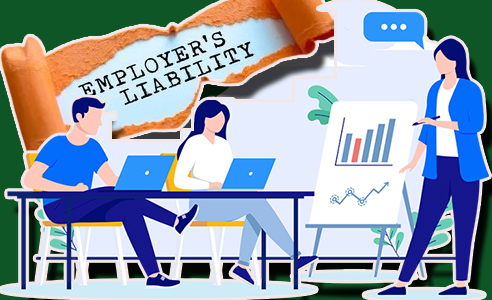An employer’s liability insurance is just like a big umbrella that guards companies from financial risks. It helps cover costs if an employee gets hurt or sick while doing their job. Even though it might seem like a basic kind of insurance, it’s important to protect businesses from money problems that can happen if someone gets hurt at work.

You might think there’s not much chance of an employee getting hurt, but accidents can happen, even when you least expect them. Having insurance makes sure your business is prepared for things like medical bills, lost pay, and legal fees. That’s why it’s a good idea for all businesses to get employers’ liability insurance.
What Employer’s Liability Insurance Covers?
Employer’s liability insurance is a crucial coverage that safeguards businesses from financial risks associated with workplace accidents, injuries, and illnesses. It protects against various types of lawsuits, including:
- Consequential Bodily Injury Lawsuits: Filed by an employee or their spouse, this type of lawsuit seeks compensation for work-related injuries or illnesses. Employer’s liability insurance helps cover medical care, rehabilitation, and other related expenses.
- Third-Party Lawsuits: If a customer, visitor, or member of the public sues an employer due to an employee’s injury, the employer’s liability insurance can help cover the legal costs and any settlements or judgments.
- Loss of Consortium Lawsuits: In cases where an employee’s injury or death negatively impacts their partner, the employer’s liability insurance can cover costs like counseling, therapy, and other related expenses.
- Dual Capacity Lawsuits: When an employee is injured or becomes ill at work, they may file a lawsuit against their employer to cover medical bills, lost wages, and other expenses. Employer’s liability insurance is designed to protect employers from financial loss in these situations.
By having employer’s liability insurance, businesses can protect themselves from potentially devastating financial consequences arising from various types of lawsuits, ensuring the well-being and stability of both the company and its employees.
What Employer’s Liability Insurance Doesn’t Cover?
While employer liability insurance provides comprehensive coverage for various work-related incidents, there are some exclusions that businesses should be aware of. Typically, an employer’s liability insurance does not cover:
- Intentional Acts: The policy will not cover any damages or losses arising from deliberate actions of the employer or employees. This includes intentional harm, malicious acts, or willful negligence.
- Property Damage: Employer’s liability insurance generally does not cover any damages to property, whether it belongs to the employer, employee, or a third party. Businesses may need separate property insurance for such coverage.
- Harassment: Claims related to harassment in the workplace, such as sexual harassment or creating a hostile work environment are typically not covered by employer’s liability insurance. Companies must maintain a safe working environment and address any harassment issues to minimize these risks.
- Discrimination: Lawsuits related to discrimination based on race, gender, religion, age, or other factors are usually excluded from the employer’s liability insurance coverage. Employers must ensure fair treatment and implement proper anti-discrimination policies.
- Violation of Employee Rights: If an employer violates an employee’s rights, such as denying rightful wages, failing to provide adequate breaks, or infringing on their privacy, the resulting legal costs and damages are not typically covered by the employer’s liability insurance.
Given these exclusions, businesses need to implement proper workplace policies, maintain a safe working environment, and consider additional insurance coverage to fill any gaps.
Frequently Asked Questions
Does Black Box Insurance Always Lead To Lower Premiums?
While black box insurance can often result in lower premiums for safe drivers, it’s not guaranteed. Your driving habits and behavior will directly impact your premiums, so if you consistently drive safely, you are more likely to enjoy lower rates.
Can I Opt Out Of Data Sharing With My Insurance Provider?
Typically, when you sign up for black box insurance, you agree to share your driving data with your insurance provider. However, you should review your policy and discuss any concerns with your insurer to understand your options for data privacy.
Are There Any Restrictions On When And Where I Can Drive?
While black box insurance doesn’t impose strict restrictions on when and where you can drive, your driving behavior during specific times or in certain areas may impact your Driver Score. For example, frequently driving late at night or in high-risk areas could potentially affect your premiums.
What Happens If I Change Vehicles or Sell My Car?
If you change vehicles or sell your car, you’ll need to inform your insurance provider. They may require you to install a new black box in your new vehicle or update your policy accordingly.
Can I Access And Review My Driving Data?
Yes, most black box insurance providers offer an online dashboard or mobile app where you can view your driving data, monitor your Driver Score, and track your progress.
Is Black Box Insurance Suitable For All Drivers?
Black box insurance can be a good option for various drivers, including young and inexperienced drivers, safe drivers looking for lower premiums, and those who don’t drive frequently. However, it might not be the best choice for those who frequently drive during high-risk times or engage in risky driving behavior.

